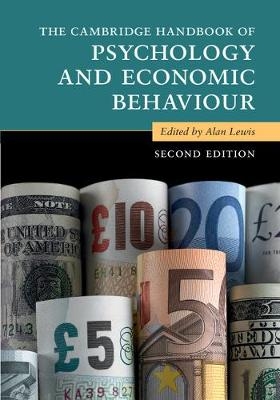
The Cambridge Handbook of Psychology and Economic Behaviour
Cambridge University Press (Verlag)
978-1-316-61390-0 (ISBN)
There has recently been an escalated interest in the interface between psychology and economics. The Cambridge Handbook of Psychology and Economic Behaviour is a valuable reference dedicated to improving our understanding of the economic mind and economic behaviour. Employing empirical methods - including laboratory and field experiments, observations, questionnaires and interviews - the Handbook provides comprehensive coverage of theory and method, financial and consumer behaviour, the environment and biological perspectives. This second edition also includes new chapters on topics such as neuroeconomics, unemployment, debt, behavioural public finance, and cutting-edge work on fuzzy trace theory and robots, cyborgs and consumption. With distinguished contributors from a variety of countries and theoretical backgrounds, the Handbook is an important step forward in the improvement of communications between the disciplines of psychology and economics that will appeal to academic researchers and graduates in economic psychology and behavioral economics.
Alan Lewis is Professor of Economic Psychology at the University of Bath. He has been publishing in the area of psychology and economics for nearly forty years, and his journal articles and books have covered such topics as socially responsible investing; ethics, altruism and economic affairs; tax evasion and fiscal preferences; environmental attitudes and behaviour; economic socialisation; and credit and debt. His books include Morals, Markets and Money (2002) and, with Paul Webley and Adrian Furnham, The New Economic Mind: The Social Psychology of Economic Behaviour (1995). Alan Lewis was also editor of the Journal of Economic Psychology from 1996 to 2000. He has presented papers at international conferences and seminars in many countries, including the USA, the UK, Canada, France, Italy, Spain, Sweden, Norway, Austria, the Czech Republic, Denmark and Belgium.
Introduction Alan Lewis; Part I. Theory and Method: 1. Theory and method in economics and psychology Denis Hilton; 2. What lessons does the 'replication crisis' in psychology hold for experimental economics? Nick Bardsley; Part II. Finance: 3. Looking into the future: how investors forecast the stock market J. Michael Collins, Werner De Bondt and Karl-Erik Wärneryd; 4. Speculative bubbles: insight from behavioral finance Werner De Bondt; 5. Intertemporal choice: choosing for the future Daniel Read, Rebecca McDonald and Lisheng He; 6. Debt: beyond Homo Economicus Matthew Sparkes, Julia Gumy and Brendan Burchell; 7. Unemployment and well-being Alex J. Wood and Brendan Burchell; 8. Money management in households Bernadette Kamleitner, Eva Marckhgott and Erich Kirchler; 9. Socially responsible investing Christopher Cowton; Part III. Private Sector Consumer Behaviour and the Firm: 10. Consumption, income and happiness Aaron Ahuvia; 11. Important non-materialistic factors in consumer decision making Gerrit Antonides and Chris van Klaveren; 12. An economic psychology of the marketing firm Gordon R. Foxall; Part IV. Public Sector Consumer Behaviour: 13. Tax psychology Jerome Olsen, Minjo Kang and Erich Kirchler; 14. New ways of understanding tax compliance: from the laboratory to the real world Michael Hallsworth; 15. 'Individual failure' and a behavioural public sector economics Lory Barile, John Cullis and Philip Jones; Part V. Environment: 16. Towards sustainable lifestyles: understanding the policy challenge Tim Jackson and Carmen Smith; 17. Understanding residential sustainable energy and policy preferences Goda Perlaviciute, Linda Steg and Ellen van der Werff; 18. Household production of photovoltaic energy: issues in economic behavior Paul C. Stern, Inga Wittenberg, Kimberly S. Wolske and Ingo Kastner; 19. Economic and psychological determinants of ownership, use and changes in use of private cars Tommy Gärling and Margareta Friman; 20. Voluntary individual carbon trading: friend or foe Clive L. Spash and Hendrik Theine; Part VI. Biological Perspectives: 21. Neuroeconomics Ifat Levy and Daniel Ehrlich; 22. The importance of evolutionary psychology for the understanding of economic behaviour Detlef Fechtenhauer and Anne-Sophie Lang; 23. Evolutionary economics and psychology Ulrich Wilt; Part VII. New Horizons: 24. Motivation and awards Bruno Frey and Jana Gallus; 25. Fuzzy-trace theory: judgments, decisions and neuroeconomics David M. N. Garavito, Rebecca B. Weldon and Valerie Reyna; 26. Robots, cyborgs and consumption Russell Belk; 27. End piece: behavioural change and 'nudge' Alan Lewis; Index.
| Erscheinungsdatum | 12.02.2018 |
|---|---|
| Reihe/Serie | Cambridge Handbooks in Psychology |
| Zusatzinfo | 8 Plates, color; 2 Halftones, black and white; 34 Line drawings, black and white |
| Verlagsort | Cambridge |
| Sprache | englisch |
| Maße | 174 x 247 mm |
| Gewicht | 1580 g |
| Themenwelt | Geisteswissenschaften ► Psychologie ► Arbeits- und Organisationspsychologie |
| Geisteswissenschaften ► Psychologie ► Sozialpsychologie | |
| Sozialwissenschaften | |
| Wirtschaft ► Volkswirtschaftslehre ► Mikroökonomie | |
| ISBN-10 | 1-316-61390-9 / 1316613909 |
| ISBN-13 | 978-1-316-61390-0 / 9781316613900 |
| Zustand | Neuware |
| Haben Sie eine Frage zum Produkt? |
aus dem Bereich


